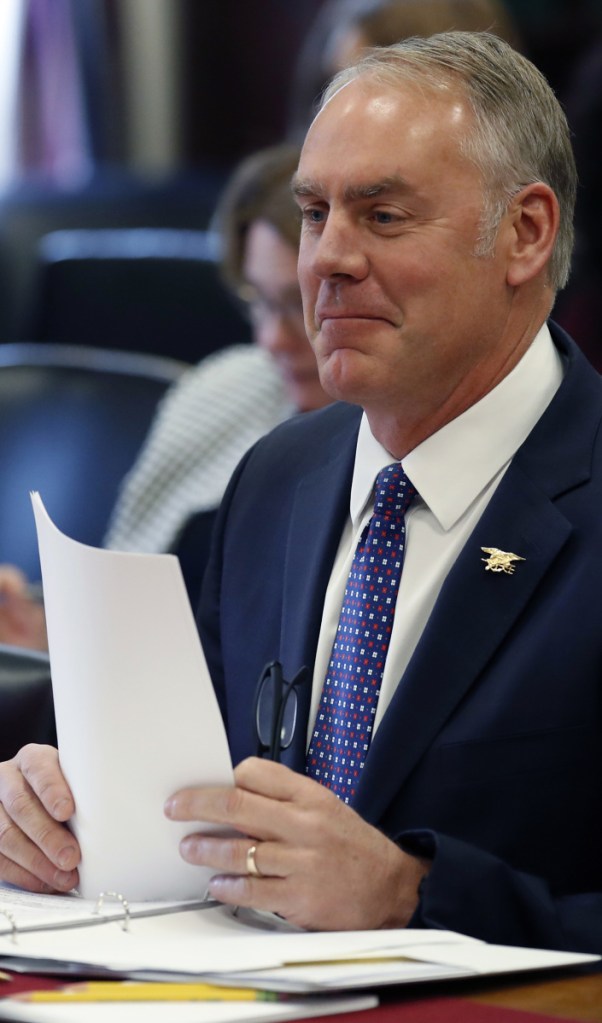Interior Secretary Ryan Zinke said Wednesday that he believes Maine will be “very happy” with a revised proposal on oil and gas drilling in the North Atlantic, noting that there are few significant fossil fuel reserves or infrastructure off Maine’s coastline.
Zinke’s comments appeared to suggest that the outer continental shelf off Maine’s coastline could be excluded from the next version of the Interior Department’s five-year plan for offshore drilling in the Atlantic.
Maine Rep. Chellie Pingree, D-1st District, pressed Zinke on the state’s status, given the strong opposition from fishermen, tourism officials, the congressional delegation and the Legislature to a January proposal to lift federal prohibitions on offshore energy exploration along the Atlantic and Pacific coastlines.
Appearing before the House Appropriations Subcommittee on the Interior, Zinke said he decided to “put everything” back on the table in order to spur a discussion about oil and gas exploration in response to federal energy lease revenues falling from $18 billion to $2.6 billion between 2008 and 2017.
But Zinke said “there isn’t any oil and gas really of significance” off of Maine’s coastline and that the only reserves where a “play” could be made are located between Georgia and Virginia.
“In the state of Maine, most of the areas, A) you don’t have the resources off of the coast, B) you don’t have infrastructure in place and, C) most of the districts along the coast and communities are not in favor of oil and gas,” Zinke said.
COALITION IN MAINE IN OPPOSITION
In response, Pingree told Zinke that he “made a lot of good arguments about why Maine should be exempted” and urged the Interior secretary to officially remove the state from consideration if the next governor opposes oil and gas drilling. Republican Gov. Paul LePage is the only East Coast governor to express support for the department exploring all areas for potential energy reserves, including the North Atlantic.
“I’m sure Maine is going to be very happy with the draft proposal,” Zinke replied, referring to the proposed environmental impact statement due this spring or summer.
The Bureau of Ocean Energy Management proposal, which is subject to change, called for two potential energy exploration lease sales in the section of the Atlantic from New Jersey to Maine.
According to Zinke, every East Coast governor except LePage and Georgia Gov. Nathan Deal opposes offshore oil and gas drilling. In Maine, all four members of the state’s congressional delegation opposed the Interior Department proposal released in January and the Maine Legislature unanimously passed a resolve urging President Trump to exclude Maine from the Interior Department’s five-year energy lease plan.
Fear that an oil spill could cause irreparable harm also has united fishermen, environmental groups and businesses – industries that form the backbone of Maine’s economy. The vast majority of people who attended the Bureau of Ocean Energy Management’s March 7 public meeting in Augusta opposed the January proposal.
PINGREE: DON’T EDIT OUT SCIENCE
During Wednesday’s Appropriations subcommittee meeting, Pingree said it was “arbitrary” of Zinke to exempt Florida and no other states along the Eastern Seaboard, especially given the strong bipartisan opposition to oil and gas exploration. Zinke said while Florida has not been officially exempted, he made a commitment to no new oil and gas platforms there because the state already has a moratorium on such activities and all parties requested Florida’s exclusion.
“States matter, the local voice matters, you matter and the governor matters,” Zinke said. “As we go through (the plan), we are shaping our plan to make sure we accommodate local voices. Fishermen matter, and fishermen aren’t very happy about wind either.”
Pingree also pressed Zinke for assurances that Interior Department officials will not edit out references to human-linked climate change in official reports. Pingree based her question on an article from the Center for Investigative Reporting that stated National Park Service officials deleted numerous references to humans’ contribution to climate change in an as-yet-unreleased report on how sea level rise and storm surge could affect national parks and historic sites.
Pingree said she’s “done” with the debate over humans’ impact on climate change, saying the link is clear.
“When that report comes out, I personally don’t want to see it edited to remove any references,” Pingree said. “We have a coastal national park in our state and, again, I think it is extremely important that departments like yours are paying attention.”
Zinke bristled at the fact that the draft report was apparently leaked to the media before he or anyone else within the Interior Department in Washington had even read it, saying he wanted an investigation into the matter. But the secretary told Pingree that he wouldn’t edit out scientific content.
“If it’s a scientific report, I’m not going to change a comma because I think that’s the integrity,” Zinke said.
Kevin Miller can be contacted at 791-6312 or at:
Twitter: KevinMillerPPH
Send questions/comments to the editors.



